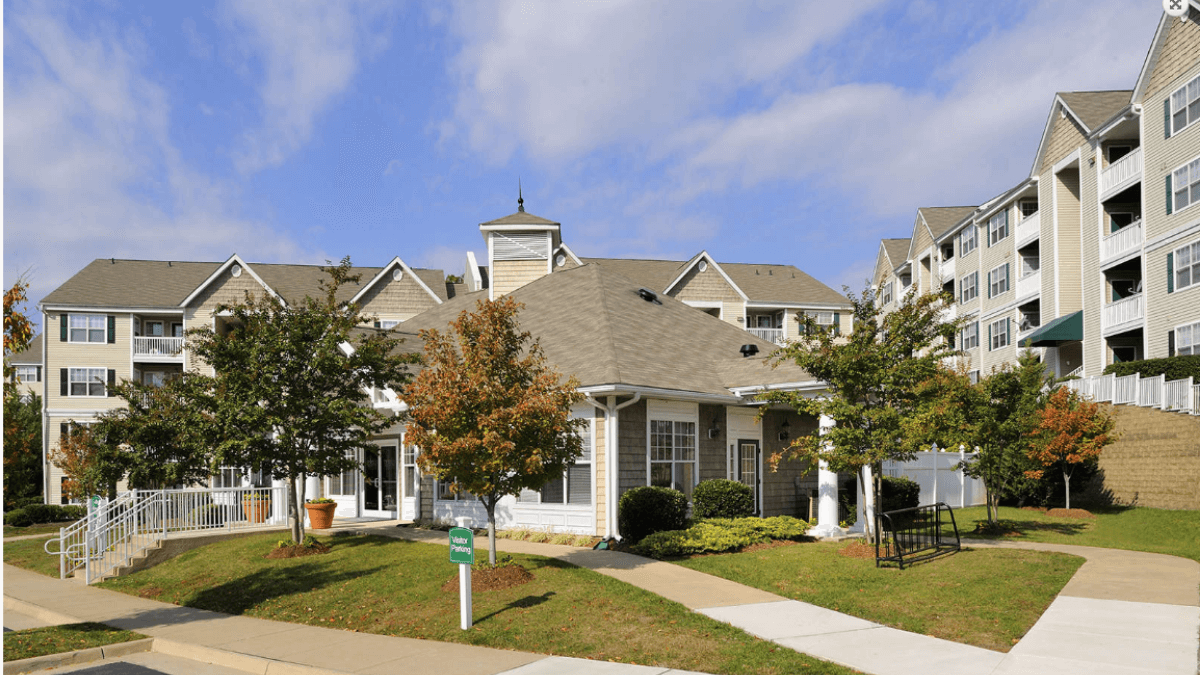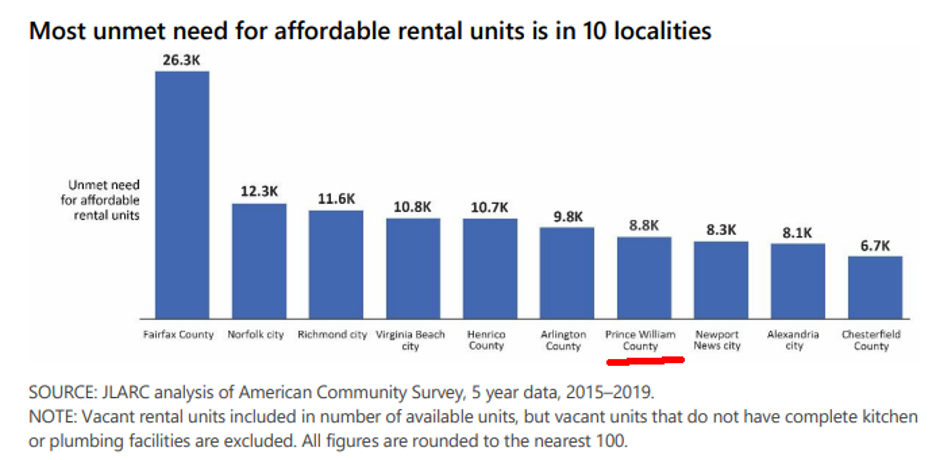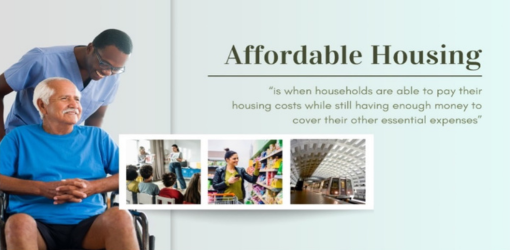VOICE Ministry
Affordable Housing
What do we mean by Affordable Housing and Why is it important to all PWC residents?

June 2025 Update
On June 3rd the Prince William County Board of Supervisors took a major step to help provide more Affordable Housing for both renters and first-time home buyers by enacting Affordable Dwelling Unit and Housing Trust Fund legislation. These actions will make more than $15.5M available to be used for this effort starting on July 1 of 2025.
May 2025 Update
The Board of County Supervisors (BOCS) adopted the FY2026 Budget on Tuesday, April 22, 2025. The real estate tax rate was lowered from $0.92 to $0.906 per $100 of assessed value. The computer and peripherals tax rate (pertinent for data centers) increased to $4.15, up from $3.70. The vehicle personal property tax rate was lowered from $3.70 to $3.50. The “meals” tax rate was also lowered from 4% to 3%.
The BOCS approved an additional $5.5 million for the Affordable Housing Trust Fund reserve, bringing the total commitment to more than $30 million by FY2029.
Additional funding for homeless services via street outreach, coordinated entry, and hypothermia services in western Prince William County were included. Funding for four additional staff members in the Office of Housing and Community Development was also included in the FY26 budget.
Bottom line: Prince William County continues to make progress on housing policy and resources to get them in line with their Northern Virginia jurisdictional peers. The draft Affordable Dwelling Unit (AfDU) Ordinance, which authorizes the Housing Trust Fund, is scheduled to go before the BOCS for adoption on June 3, 2025. Housing Trust Fund guidelines have been drafted, with the assistance of NVAHA, and stakeholder feedback is being incorporated. Additionally, AfDU purchase and rental administrative policies and program procedures are being reviewed by the County Attorney’s office.
June 2024 Update
Meeting with Senator Warner and Chair Jefferson
On Friday, June 21st Prince William County VOICE Leadership and key community partner allies met with US Senator Mark Warner and Prince William County Board of Supervisors Chair Deshundra Jefferson for a round-table discussion on the State of Housing in Prince William County. The following topics were covered:
- The need to secure a robust housing trust fund involving both dedicated PWC funds as well as funding from state, federal, non-profit and developer sources.
- The need to obtain State legislature support to enact a mandatory Affordable Dwelling Unit Ordinance.
- The need to expedite the PWC approval process for Affordable Housing projects.
- The need to proactively collaborate with the PWC School Board, Transportation Agencies and Police, Fire and EMS first responders in planning and approving Affordable Housing projects.
- The need for elected leadership at all levels to set a tone and tenor which supports affordable housing at public community events.
- The need to address concerns about exclusionary zoning.
The need to pursue the opportunity for “Yes in God’s Backyard” housing at places of worship within the county.
May 2024 Update
Additional Funds For Housing Trust Fund
In May PWC Board of Supervisors voted to approve a full $5 million of additional funding in the FY2025 budget for the county’s soon-to-be-established Affordable Housing Trust Fund. This brings the total investment that VOICE and our allies were able to secure over the past four months to $10 million, meaning this vital fund will start on a strong footing. VOICE thanks our allies from Tenants and Workers United, Northern Virginia Affordable Housing Alliance, and Wellington Development, who played crucial roles in this victory. We also thank the Board members who voted in favor of the increase: Chair Jefferson and Supervisors Boddye, Bailey, Franklin, and Angry. Read more here.
Also, in May the PWC Planning Commission asked VOICE and its allies to review and provide comments on the most recent draft of the proposed AfDU. This event was seen as a significant victory in our goal to obtain a “seat at the table” in helping to increase the amount of available affordable housing.
VOICE has been active in meeting with the Board and providing inputs for consideration in the Board’s planning. You can read two of the letters here (On the need for fiscal support) and here (comments on the draft Affordable Dwelling Unit Ordinance).
February 2024 Update
PWC EXECUTIVE OFFICE MEETING
On Wednesday, January 3rd members of the VOICE leadership met virtually with PWC Executive Officer, Christopher Shorter to receive an update on the plans to improve availability of Affordable Housing in Prince William County in 2024. The following was learned:
- In a late December meeting PWC Board of Supervisors approved the use of $5M unused funds from the 2023 budget to create a Housing Trust Fund (HTF).
- Discussion continues on how to ensure the HTF receives a continued sources of funds in this and future years.
- County officials are developing a plan for priority use of these funds.
- Structure and wording of a proposed Affordable Dwelling Unit (ADU) Ordinance is in progress.
- A planned timeline was mentioned which included the release of the proposed ordinance for public comment via Town Hall meetings later this year with a targeted presentation to the PWC Board of Supervisors in the fall of 2024.
- It was also announced a new Director of the PWC Planning Department was hired (Ms. Washington Stern – from Montgomery County, MD – Start date February 1, 2024) to will help expedite this process.
County leadership acknowledged the need to improve/upgrade staff and Infrastructure of the PWC Office of Housing and Community Development to Administer ADU Ordinance and Housing Trust Fund.
STATE PROPOSALS TO HELP INCREASE AVAILABILITY OF AFFORDABLE HOUSING
Senator Jeremy McPike (D), VA District 29 has introduced legislation (Affordable Dwelling Unit (ADU) Bill) which would any locality in the Commonwealth to provide for an affordable housing dwelling unit program by amending the zoning ordinance of such locality. Current law restricts such authorization to counties with an urban county executive form of government or county manager plan of government and certain other localities.
LEARN MORE
Senator Ghazala F. Hashmi (D) VA District 15 has introduced legislation which will permit a religious organization, defined in the bill, to construct affordable housing on real estate owned by such religious organization.
LEARN MORE
The Northern Virginia Affordable Housing Alliance (NVAHA) and the Alliance for Housing Solutions (AHS), have merged effective January 1, 2024. The decision to merge stems from a shared commitment of both organizations to better serve the community
LEARN MORE
November 2023 Update
Who Lives In Affordable Housing ?
The NORTHERN VIRGINIA ALLIANCE FOR AFFORDABLE HOUSING (NVHA) whose mission is to promote healthy, sustainable, and equitable communities that meet the diverse housing needs of Northern Virginia residents has developed an excellent website to educate all on the issue and importance of providing affordable housing to all NOVA residents. LEARN MORE.
PWC County Supervisors Frustrated on Affordable Housing Progress
Prince William County needs more housing, especially more affordable housing. But county officials need more tools to reach those goals, and some supervisors say progress isn’t coming fast enough.
“We need to average about 3,000 new units in the county” Wade Hugh, Deputy County Executive for Development Services said during the supervisors Tuesday, Oct. 17 work session on affordable housing. That’s the number of housing units the county needs to add each year through 2030 to meet the housing goals set by the Metropolitan Washington Council of Governments.
At one point, the county was steadily adding new housing and reached an annual high of 7,000 new units in 2005. But that changed during the Great Recession, when the annual number of new housing units plunged below 3,000. Since then, the number has stayed well under 3,000, falling short of demand. In 2023, the county issued only about 1,000 occupancy permits for new homes, according to statistics shared with the supervisors during the Oct. 17 work session. For more than a decade, the county has been in a “housing shortfall” as evidenced by the inability to add at least 3,000 new housing units a year since about 2010. Source: the Prince William County Planning Commission Office. LEARN MORE.
July 2023 Update:
AFFORDABLE HOUSING SUMMIT – On July13th Families For Affordable Housing sponsored a summit at the Ferlazzo Building Auditorium in Woodbridge. At this event Jill Norcross. Executive Director of the Northern Virginia Affordable Housing Alliance (NVAHA) provided and overview the challenges we face in increasing the amount of both affordable and available rental and ownership housing in Prince William County.
Also, a panel of Rev. Dr. Keith Savage (PWC VOICE Co-Chair), VA State Delegate Michelle Maldonado, and PWC Potomac Supervisor Andrea Bailey provided input and answered questions on this issue.
During the discussion Delegate Maldonado committed to support providing funding and changes to existing legal restrictions to improve availability of affordable housing state-wide and Supervisor Bailey committed to support enacting an Affordable Housing Ordinance and a Housing Trust Fund in PWC this year.
NOVA VOICE Leaders Meet with PWC BOS Chair – On July 26th members of NOVA VOICE met with Prince William County Board of Supervisors Chair, Ann B. Wheeler. The purpose of the meeting was to provide her thanks for past support and deepening our relationship.
During the meeting Chair Wheeler share her commitment that the Board of Supervisors would be addressing the issues of creating a meaningful Affordable Housing Ordinance and a Housing Trust Fund during the remaining months of 2023. She also shared her recent success in offering a “Bonus Density” to encourage developers to build more affordable housing and a commitment for PWC to develop specific annual goal/target numbers of the various levels of affordable housing (low, medium, and high).
Report: County needs at least 8,800 affordable rental units – A new report has found that Prince William County is short at least 8,800 affordable rental units as housing costs in the region continue to rise.
The findings were part of a statewide review published by Virginia’s Joint Legislative and Audit Review Commission (JLARC) in December that examined affordability, the state’s existing housing programs and the impact of local zoning policies.
The report found that Virginia is short at least 200,000 affordable rental units, with the bulk of those needed in the commonwealth’s “urban crescent” of Northern Virginia, central Virginia, and Hampton Roads. Analysts for the agency found that 29% of Virginia households are “cost-burdened,” a measure that refers to individuals and families who spend more than 30% of their income on housing.

For more information click here – 8,800 more affordable units.
Background: What do we mean by Affordable Housing and Why is it important to all PWC residents?
Who are first time home buyers in our area? They are teachers, nurses, police officers, emergency responders, and others who work in the county. Here are some statistics on issues PWC residents face when attempting to buy their first home:
- The median or mid-point sales price for a home in Prince William County has risen to $520,000.
- The annual median income for a Prince William County resident is just over $109,000.
- The required down payment for first time home buyers ranges from 10% to 20% of the purchase price.
- Based on loan industry standards – someone making the annual median income in Prince William County can afford a house costing no more than $378,000!
- The county also reports we are facing a shortfall of at least 20,000 homes by 2040 to keep up with current demand.
We need affordable work force home buying options so our teachers, nurses, police officers, emergency personnel, and others who work in the county can afford to live here!
It is not just home ownership. PWC residents face barriers when trying to rent a “livable” apartment. Here are some statistics on issues potential renters are faced with:
- The average rate to rent a 850 square foot apartment in Dale City, VA is $19,200 annually or $1,650 per month.
- Using the accepted metric that housing costs should not exceed 30% of annual income, an individual looking to rent this 850 sq ft apartment would have to earn a salary of $64,000 annually or $31 dollars an hour.
We need affordable work force apartment rental options so individuals with entry level jobs in the workforce like store clerks, medical technicians, domestic workers and others who live in the county can afford to live here.
We need creative solutions to the affordable housing issue in Prince William County for example:
- Establish an Affordable Housing Trust Fund
- Implement an Affordable Dwelling Unit ordinance
- Explore public private partnerships
- Assure re-zoning options address environmental concerns
How is Prince William Planning to Address Affordable Housing?
The PWC Comprehensive Plan, Pathway to 2040 has set specific goals for addressing affordable housing. The St. Francis VOICE Ministry was proactive in working to establish the goals and the strategies by which these goals could be reached. You can read the full Housing Plan here. But here is a synopsis of the goals and strategies. It is a comprehensive plan that includes more than just affordable housing. It is based on:
Pathway to 2040
The Guiding Principles:
- Quality, price-appropriate housing – housing that costs 30% of the household’s annual gross income or less, that meets the needs of all current and future residents
- Implicit in this idea of attainability is the idea that a range of housing options (type, size, tenure, cost) should exist in the local market for a range of household income bands and preferences to support existing and new residents regardless of income.
- Housing is directly tied to public policy priorities such as economic development, education, transportation, environment, and health.
The Guiding Policies:
- Preserve and enhance existing neighborhood communities.
- Establish diverse mixed income housing communities that address the demand for additional housing, the demand for a variety of housing, and the demand for affordable housing.
- Develop implementation tools for both residents and the development community to provide for the construction and financing of affordable dwelling units to reduce disparities in the County (Policy # 3)
- Enhance mobility strategies that address the intrinsic relationship between housing and mobility in order to transportation costs in terms of both time and money and encourage multi-modal options that enhance the environment resulting in a greater quality of life for residents.
- Promote sustainable neighborhoods that support County-wide environmental goals, including reducing energy costs for residents and property owners.
- Ensure that developments result in equitable health communities that provide all neighborhoods the same services, amenities, open space, and recreational components in a quality setting.
- Identify regulatory changes needed to support implementation of these housing policies including universal design and accessibility enhancements.
Housing Policy 3: Affordable Dwelling Units –Here are the goals in concrete terms – Develop implementation tools for both residents and the development community to provide for the construction and financing of affordable dwelling units to reduce housing disparities in the County. Ensure the construction and financing of affordable and workforce housing to meet the projected demands of 33% affordable and 42% workforce housing as shown in the table below:
Goals: Number of Housing Units |
||||
| 2025 | 2030 | 2035 | 2040 | |
| Affordable Dwelling Units for families with 80% or less of AMI (MFI) | 58,600 | 63,400 | 66,500 | 69,000 |
| Workforce Dwelling Units for families with more than 80% of AMI (MFI) up to 120% | 74,600 | 80,700 | 84,60 | 87,800 |
Action Strategies:
H3.1: Research, develop, adopt, and implement an Affordable Dwelling Unit (“ADU”) ordinance to provide incentives for the development community to voluntarily support the affordable housing needs of the County.
H3.2: Encourage residential developments to incorporate affordable housing units especially in communities with proximity to transit facilities, services, and employment centers.
H3.3: Prevent and reduce homelessness housing insecurity by:
- Considering the establishment of homeless navigation centers in eastern and western Prince William County.
- Supporting permanent supportive housing for persons with disabilities who are experiencing homelessness.
- Supporting community partnership efforts to increase the range of diverse, affordable housing options.
H3.4: Consider creating a source of public subsidies (Federal, state, or County) in order to develop new affordable housing or to preserve existing housing at rents or prices that are affordable to the community’s low-income and moderate-income residents. Consider subsidy options where appropriate and consistent with applicable law, such as:
- Low-interest loan, grant, or tax credit,
- Subsidy in the form of reduced land costs,
Background reading: Report: Prince William County’s housing shortage to persist without policy changes
VOICE Ministry Contact Form
This contact form is for those who want to contact ministry leaders, ask questions, or find out to become involved in the Church’s outreach to the public square where we live.
"*" indicates required fields
